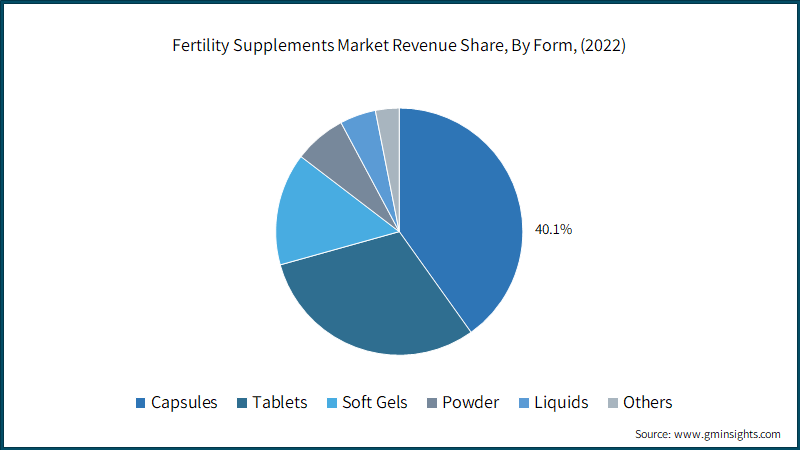Home > Food & Beverages > Nutraceuticals > Fertility Supplements Market
Fertility Supplements Market Analysis
- Report ID: GMI7083
- Published Date: Oct 2023
- Report Format: PDF
Fertility Supplements Market Analysis:
Based on ingredients, the synthetic segment dominated around USD 1.60 billion revenue in 2022, owing to the rising frequency of fertility-related difficulties and the desire for faster results. Synthetic supplements are manufactured with exact and strong quantities of certain vitamins, minerals, and chemicals, making them an appealing option for people looking for quick help with reproductive issues.

Based on form, the capsules segment accounted for 40.1% of the fertility supplements market share in 2022. Capsules are popular because they eliminate the need for measurement and mixing, making them a simple and hassle-free solution for people looking to improve their fertility. Furthermore, capsules are frequently linked with a better level of product consistency, quality, and stability, which instills trust in customers seeking dependable and consistent solutions to support their reproductive health goals.
Based on end-use, the women fertility supplements industry is anticipated to grow at 9% CAGR through 2032. Women's increased desire for fertility supplements can be ascribed to a variety of circumstances, including postponed family planning, increased knowledge of of fertility-related difficulties, and lifestyle choices. Women are increasingly choosing to have children later in life, which might result in reproductive issues, making them more likely to seek supplements. Furthermore, the prevalence of stress, environmental pollutants, and lifestyle variables including poor food and sedentary behaviors has driven interest in fertility supplements as a method of supporting reproductive health.
Based on distribution channel, the Over-the-counter (OTC) segment held over USD 1.43 billion revenue in 2022, due to the rising incidence of reproductive disorders, as well as the need for accessible and convenient remedies. Couples with reproductive issues frequently prefer over-the-counter vitamins since they can be purchased without a prescription, saving time and money.

North America fertility supplements market size reached USD 0.67 billion in 2022. Infertility is becoming more common in North America because of factors such as delayed childbirth, lifestyle changes, and environmental contaminants. North American consumers are increasingly seeking customised items, such as fertility supplements suited to their specific needs. Personalized fertility supplement mixes are now available from several fertility supplement suppliers.

